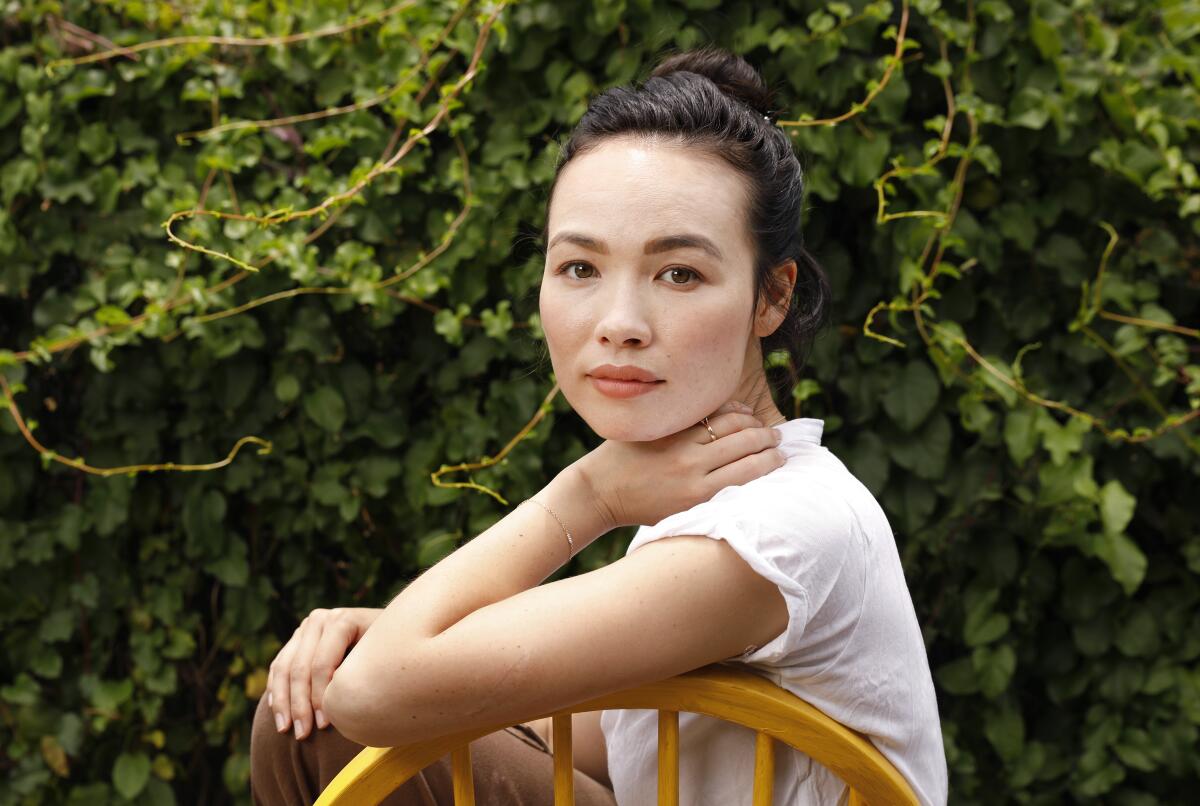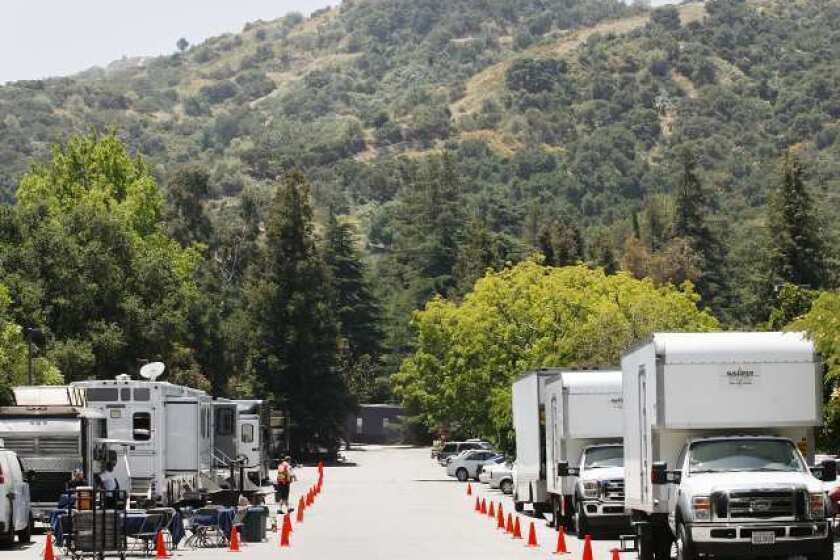With no money for groceries, rent, these working actors got help amid the pandemic

- Share via
Actress and dancer Hanna-Lee Sakakibara had bagged small parts on shows like “Lucifer” and “The Young and the Restless.” She had just finished shooting a 7-Eleven commercial and was about to start her first lead role in a fringe play about a Vietnamese immigrant in America when the pandemic hit.
The Japanese Australian performer suddenly found herself with no work and no income stream.
For the record:
11:47 a.m. June 19, 2020An earlier version of this article misspelled actress Laura Pruden’s last name as Purden.
“It suddenly was like, crickets,” said Sakakibara, 35, from her home in Pasadena. “I had some money in the bank but I knew that ... was going to run out very quickly.”
So Sakakibara turned to the SAG-AFTRA Foundation’s COVID-19 relief fund, which gave a $1,000 check, which she put toward rent and groceries.
She is among the more than 5,600 SAG-AFTRA memberswho’ve received help from the foundation since the coronavirus outbreak caused a shutdown of the industry in March.
The nonprofit raised nearly $8 million since launching the COVID-19 relief fund with the help of A-list actors like Meryl Streep, Tom Hanks, Viola Davis and Bryan Cranston. Over $5 million of that has already been paid out to actors to help pay for food, shelter and utilities. But given the extraordinary demand for assistance, the foundation has raised its fundraising target to $12 million to help support the industry in the coming months.
With safety protocols set forth by Hollywood unions and the state of California, the film and TV industry is hoping to get back to work.
“The road ahead is of course very murky,” said foundation President Courtney B. Vance. Even though production in California is set to start up again this week, many in the industry don’t see major films ramping up until later in the summer.
The production shutdown has been not only stopped acting work but eliminated second or even third jobs that many relied on to make ends meet.
“Just because we are returning to production, it doesn’t mean the jobs will return quickly, especially for women over 40, young talent trying to break in and those underrepresented actors,” Vance said. “For those categories it is absolutely catastrophic.”
“This pandemic has been devastating for performing artists,” actor Lupita Nyong’o, who contributed to the fund, said a statement. “For too many, this fund may be their only safety net, which highlights the cracks in the larger socioeconomic system.”
Both Netflix and Sony Pictures each contributed over $1 million to the fund. Individual donors include agent Bryan Lourd and film producer and New York Giants Chairman Steve Tisch.
The 35-year-old foundation is supported through grants, individual gifts and the union’s annual awards show.
Those getting help aren’t household names, but are typically working actors who hold down many jobs to earn a living as a performer.
“The vast majority of actors don’t make millions,” said Vance, an Emmy-winning actor known for his role as O.J. Simpson lawyer Johnnie Cochran in 2016’s “American Crime Story.” “All of the characters we see on the shows, the costars, make their living going paycheck to paycheck.”
Among them is Harlem-based actress Laura Pruden.
In recent years, you might have seen Pruden on “Law & Order: Special Victims Unit” or in a sketch as a Jill Stein supporter on “Last Week Tonight With John Oliver.”
She earned most of her money from commercials and side jobs such as bookkeeping or teaching, but the shutdown stopped that income.
Instead of the $10,000 she planned to make from March to May, she pulled in around $1,500 from teaching remote classes. She had planned to teach this summer at the American Musical and Dramatic Academy, but that program was canceled.
“I lost four jobs in four days. All of my income stopped,” said Pruden, 50. She was on the phone with the foundation answering questions when an email came through canceling her last job. “What am i going to do?” she wondered. The foundation gave her $1,500.
“It was such a relief,” she said. She paused paying rent and bills, assuming she would not be evicted or cut off, and instead used the money for groceries and buying medicine for her 11- and 14-year-old children, who “have been snacking like maniacs.”
Robert Taylor Jr. typically juggles multiple jobs to stay afloat. When he isn’t auditioning for acting roles, he is a dance instructor, wedding singer, music producer and bar mitzvah emcee. One recent highlight for the 40-year-old was landing a part on Broadway with “SpongeBob SquarePants, The Musical.”
But the pandemic has cost him about $8,000 from lost work at weddings, bar mitzvahs and dance classes which were all canceled over March and April, he said.
“Everything got canceled and I had no idea what I was going to do,” Taylor Jr. said, who is based in Brooklyn’s Crown Heights. He couldn’t claim unemployment insurance , so “I didn’t have much in my bank account.” Getting $1,000 from the foundation meant he could get groceries and pay a few bills.
Some work has come back for Taylor Jr., who recently landed a virtual dance-teaching gig. “Last week, little by little, some things started to come back,” he said.
But because of the heavy requirements producers must meet to start filming, including staggered shoots with smaller crews, some jobs may not come back.
“Going forward, it just seems clear we are going to have fewer jobs available,” Pruden said.
More to Read
Inside the business of entertainment
The Wide Shot brings you news, analysis and insights on everything from streaming wars to production — and what it all means for the future.
You may occasionally receive promotional content from the Los Angeles Times.












